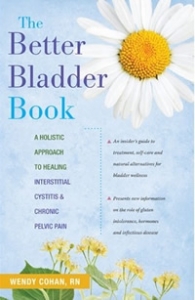By Wendy Cohan RN & Jill Osborne MA
It’s a problem no one feels comfortable talking about – always running to the bathroom! Bladder problems run the gamut – extended bedwetting in children, frequency and urgency in adults, stress incontinence after childbirth and in seniors, and difficulty urinating in older men. Perhaps most problematic of all is the surprisingly large number of people who suffer from recurrent bladder infections or from interstitial cystitis (IC/BPS). Could there be a common cause underlying many of these bladder problems? One strong possibility is food sensitivities that trigger an allergic response, an autoimmune response, or both.
We’ve heard quite a bit about growing incidence of food sensitivities in children. But adults have food sensitivities, too, and they’re more often likely to be undiagnosed. According to the US Dept. of Agriculture, there are eight top food allergens, which include dairy products, eggs, fish and shellfish, soy, peanuts, tree nuts (like pecans and walnuts), and wheat. Consuming any of these foods, or food ingredients, can trigger an allergic reaction which induces the body to release inflammatory chemicals like histamine from mast cells in the mucosa lining of the respiratory and gastrointestinal tracts, causing the reactions we’re familiar with, such as sneezing, a runny nose, and indigestion. The bladder lining contains mast cells, too—capable of releasing large amounts of histamine and other inflammatory substances which irritate the bladder, triggering uncomfortable symptoms.
An excerpt from The Better Bladder Book – A Holistic Approach to Healing Interstitial Cystitis & Chronic Pelvic Pain, by recovered IC patient and health writer Wendy Cohan, RN, helps explain this connection:
“…patients with chronic bladder pain and urgency often have elevated levels of histamine and other inflammatory markers in their urine. These findings indicate that a heightened immune response in reaction to environmental or food sensitivities or allergies may be responsible for bladder symptoms. Another clue is that some patients experience relief of symptoms when on IV fluids, when too ill to eat solid food, or when following an allergy-elimination diet. Food sensitivities have also been implicated in bed-wetting in children, due to irritation of the urinary tract. Studies have shown that once food allergens are eliminated, the bed-wetting problem often ceases to be an issue.”(1)
Food allergies involve an immune mediated response—your body produces antibodies to certain foods, and these antibodies help your body recognize and react to specific foods each and every time you ingest them. But food allergies are not the only form of food sensitivities. In contrast to true food allergies, other foods may simply be difficult to digest or they tend to create inflammation in the body, which can worsen or trigger conditions like chronic pelvic pain and contribute to bladder symptoms in IC/BPS. Some of these inflammatory foods can include members of the nightshade family, such as tomatoes, eggplant, or red peppers. Sugar, whether from cane or sugar beets, is a common trigger of bladder spasms and urinary frequency, and sugar in these forms can also alter conditions of the bladder lining, making it more vulnerable to the microorganisms that cause urinary tract infections.
Is Gluten Sensitivity Part of Your Bladder Symptom Picture?
Let’s go back to wheat, one of the top eight allergens. It’s true that anyone can develop an allergy to wheat, but in the US, wheat is also the most plentiful source of a substance known as “gluten.” Gluten is a common name for a group of proteins found in wheat, barley, rye, and related grains, including spelt, triticale, and faro. Gluten is the substance that makes pizza dough stretchy and gives artisan breads their great texture. But in some people, gluten can cause toxicity and inflammation. Our body’s immune response to gluten can wreak havoc, causing symptoms that show up in our nervous system, gastrointestinal system, and in our skin and related tissues.
The body’s reaction to gluten frequently affects mucous membranes, including the very specialized mucous membrane lining the bladder. Recently it has become known that gluten sensitivity can contribute to symptoms in the urinary tract, including an association with IC/BPS.(2, 3) In some people, chronic inflammation and accompanying irritation and pain may indicate the existence of an autoimmune condition like celiac disease – a hereditary form of gluten intolerance. (An autoimmune condition occurs when the body’s immune response mistakenly targets its own tissues, in this case, the absorptive surface of the small intestine). Celiac disease and IC/BPS often occur together, as reported by participants in support groups for both diseases, says Ms. Cohan in the book.(4) A 2008 article entitled “Gluten Sensitivity and Bladder Disease” and the dozens of powerful responses it received, may have inspired researchers to begin taking a closer look at a possible association between these two disorders.( 5)
One of the first clinical studies was recently concluded at Texas Medical Center, Baylor College of Medicine, in Houston, Texas. Principal researchers Chris Smith, MD, Peter Lotze, MD, Chris Jayne, MD, David Goldfarb, MD, and Fred Emmite, RPh, looked for overlap in the genetic expression of patients with IC/BPS and sensitivity to gluten, including celiac disease, in thirty-nine female patients with confirmed IC/BPS. Preliminary results indicate a strong association between celiac disease/ gluten sensitivity in all subjects studied, and continuing studies have so far shown promising results in the group of patients placed on a strict gluten-free diet.(6)
In a separate study based on a selfreported patient survey, the ICA found that 12% of IC patients reported being diagnosed with celiac disease in an online survey of 1,000 participants.(7) This is much higher than the roughly 1% occurrence of celiac disease in the general population. However, even those who don’t test positive for celiac disease may still experience gluten-associated bladder sensitivity. Non-celiac gluten intolerance affects many more people with a variety of symptoms, but the bladder and the prostate seem particularly sensitive to gluten ingestion, as the many anecdotal stories from IC/BPS and chronic prostatitis (CP) patients support.
Until recently, it wasn’t known what “triggers” or provokes periods of worsening bladder symptoms in some people. Experienced IC/BPS patients are usually careful to eliminate “extreme” foods like coffee, vinegar, soy sauce, and alcohol, in favor of bland, neutral, and non-acidic foods. Still, they often continue to suffer painful “flares.” But there was a glimmer of hope in the small percentage of people who seemed to heal spontaneously through a holistic approach involving self-treatment, relaxation, stress reduction, and purposeful attention to diet.
One of the food sensitivities these recovered patients frequently mention is wheat, or in many cases all forms of gluten. Patients in support groups for disorders like IC/BPS and celiac disease report that eliminating gluten helped resolve their bladder symptoms, and in many cases, it was the only “treatment” that made a significant difference.(8) Could avoiding gluten from wheat and other glutencontaining grains really be the answer for thousands of people who suffer daily from urgency, frequency, and incontinence, or from IC? This question certainly warrants further investigation.
Eliminating gluten from your diet isn’t difficult, especially in light of all the new gluten-free products coming on the market.
Ms. Cohan believes there is a relatively easy answer, as she states in The Better Bladder Book:
“We don’t yet know what percentage of IC patients have an autoimmune reaction to gluten, gluten sensitivity, or a wheat allergy (although the evidence in the Baylor study…is very impressive and should lead to further research). However, IC patients could be easily screened for celiac disease or gluten sensitivity at the time of their diagnosis, and sensitive individuals could be encouraged to follow a gluten-free diet.”(9)
If your IC isn’t getting any better on standard treatments, testing for food sensitivities should be a priority. Eliminating gluten from your diet isn’t difficult, especially in light of all the new gluten-free products coming on the market. In fact, for some patients, following a gluten-free diet may be less restrictive and easier to follow than the recommended “IC diet,” as well as nutritionally sound. Patients who are very ill, with extremely sensitive bladders, will still need to exclude most common bladder irritants for at least several months until the bladder lining has begun to heal. In most cases, those patients who have been ill for a long time will also take longer to heal.
 The Better Bladder Book – A Holistic Approach to Healing Interstitial Cystitis & Chronic Pelvic Pain contains a complete guide to “Getting Started on a Gluten- Free Diet” and a chapter thoroughly explaining gluten intolerance and other food sensitivities. More help is widely available through online sources, dozens of popular gluten-free cookbooks, and support organizations like the NFCA (National Foundation for Celiac Awareness), www.celiac.com, and through experienced celiac nurse-educators (www.glutenfreechoice.com, www.glutenfreeRN, www.celiacnurse. com).
The Better Bladder Book – A Holistic Approach to Healing Interstitial Cystitis & Chronic Pelvic Pain contains a complete guide to “Getting Started on a Gluten- Free Diet” and a chapter thoroughly explaining gluten intolerance and other food sensitivities. More help is widely available through online sources, dozens of popular gluten-free cookbooks, and support organizations like the NFCA (National Foundation for Celiac Awareness), www.celiac.com, and through experienced celiac nurse-educators (www.glutenfreechoice.com, www.glutenfreeRN, www.celiacnurse. com).
Wendy Cohan, a registered nurse and recovered IC patient from the Pacific Northwest, was one of the first health professionals to notice and suggest dietary exclusion of gluten in the treatment of IC. After writing articles about gluten sensitivity for IC and celiac websites, and overwhelmed by the response she received, she began writing a book about her experiences in 2008. Her book, The Better Bladder Book – A Holistic Approach to Healing Interstitial Cystitis & Chronic Pelvic Pain, was released in November, 2010. Coincidentally, since beginning her book, two small research studies have found a significant correlation between gluten sensitivity and bladder symptoms, especially in IC.
References
- Cohan, W. The Better Bladder Book – A Holistic Approach to Healing Interstitial Cystitis & Chronic Pelvic Pain. Alameda, CA, Hunter House Publishing. 2010: pg. 106.
- Emmite, F. in: Cohan, W. The Better Bladder Book – A Holistic Approach to Healing Interstitial Cystitis & Chronic Pelvic Pain. Alameda, CA, Hunter House Publishing. 2010: pg. 107.
- ICA-ICHelp.org. Research Updates. “IC and Celiac Disease Overlap for Some”. 10/6/2010. http://www.ichelp.org/Page.aspx?pid=450
- Cohan, W. The Better Bladder Book – A Holistic Approach to Healing Interstitial Cystitis & Chronic Pelvic Pain. Alameda, CA, Hunter House Publishing. 2010: pg. 106.
- Cohan, W. “Gluten Sensitivity and Bladder Disease”. 8/28/2008. http://www.celiac.com/articles/21636/1/Glut en-Sensitivity-and-Bladder- Disease/Page1.html
- Emmite, F. in: Cohan, W. The Better Bladder Book – A Holistic Approach to Healing Interstitial Cystitis & Chronic Pelvic Pain. Alameda, CA, Hunter House Publishing. 2010: pg. 107.
- ICA-ICHelp.org. Research Updates. “IC and Celiac Disease Overlap for Some”. 10/6/2010. http://www.ichelp.org/Page.aspx?pid=450
- Cohan, W. “Gluten Sensitivity and Bladder Disease”. 8/28/2008. http://www.celiac.com/articles/21636/1/Glut en-Sensitivity-and-Bladder- Disease/Page1.html
- Cohan, W. The Better Bladder Book – A Holistic Approach to Healing Interstitial Cystitis & Chronic Pelvic Pain. Alameda, CA, Hunter House Publishing. 2010: pg. 109.

